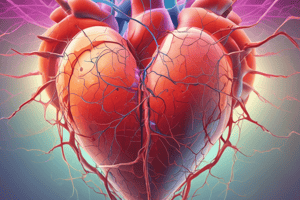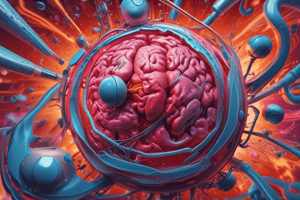Podcast
Questions and Answers
What are some less common causes of Disseminated Intravascular Coagulation (DIC)?
What are some less common causes of Disseminated Intravascular Coagulation (DIC)?
Severe tissue damage, prostate surgery complications, snake venom enzymes, acute hemolytic transfusion reactions, aortic aneurysms or cavernous hemangiomas
How does slowly evolving DIC primarily manifest in terms of thromboembolic events?
How does slowly evolving DIC primarily manifest in terms of thromboembolic events?
Venous thromboembolic manifestations such as deep venous thrombosis and pulmonary embolism
What are the consequences of severe, rapidly evolving DIC?
What are the consequences of severe, rapidly evolving DIC?
Thrombocytopenia, depletion of plasma coagulation factors and fibrinogen, and bleeding
How does delayed dissolution of fibrin polymers in DIC affect red blood cells?
How does delayed dissolution of fibrin polymers in DIC affect red blood cells?
What are the key components of the management of shock as outlined in the lecture?
What are the key components of the management of shock as outlined in the lecture?




